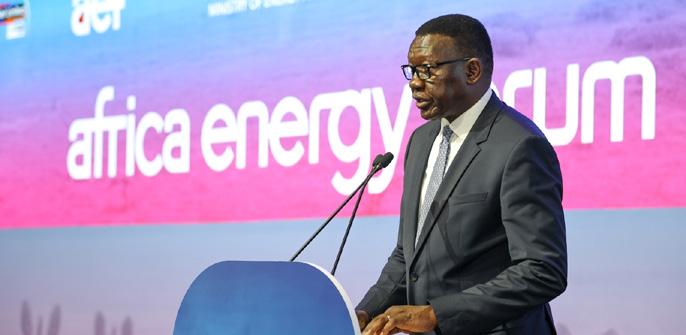
5 minute read
KENYA IS OPEN FOR BUSINESS
from theTradeEnvoy
The government of Kenya, under the leadership of President William Ruto, is implementing measures to attract foreign businesses. President Ruto, speaking on May 8, 2023, at a business forum in The Hague, Netherlands, stated, “We have taken measures to improve our one-stop-shop facility to make it easy for investors to do business in the country.” He highlighted the Government’s initiative to attract foreign direct investments.
Kenya Investment Authority
Advertisement
In a bid to encourage investment, the National Assembly enacted the Investment Promotion Act, 2004 (the IPA). The IPA seeks to reduce bureaucratic delays concerning licensing, immigration, and the negotiation of tax incentives and exemptions. This Act led to the establishment of the Kenya Investments Authority (KenInvest) tasked with achieving the legislation’s goals.
Investment Incentives
For a foreign investor to qualify for an investment certificate, the minimum value of the proposed investment should be USD 100,000 or its equivalent in another currency. KenInvest evaluates an investment’s contribution to the Kenyan economy considering several factors like job creation, skill development, economic development, technology transfer, tax revenue, foreign exchange impact, utilization of domestic raw materials, and value addition in processing local resources.
For a foreign investor to qualify for an investment certificate, the minimum value of the proposed investment should be USD 100,000 or its equivalent in another currency. KenInvest evaluates an investment’s contribution to the Kenyan economy considering several factors like job creation, skill development, economic development, technology transfer, tax revenue, foreign exchange impact, utilization of domestic raw materials, and value addition in processing local resources.
Investors granted an investment certificate under the IPA receive important benefits, primarily facilitated by KenInvest in issuing all necessary licenses and permits required for the investor’s operations. Additionally, there are several industry-specific incentives in the form of tax exemptions and lower tax rates for sectors like energy, mining, hospitality and tourism, fishing, and the automotive industry to spur economic growth.
Investor Protection
Several reforms have been introduced to Kenya’s laws to protect investors. Notably, the Business Laws (Amendment) Act, 2020 amended the Companies Act to protect the rights of minority investors. Now, minority shareholders holding a minimum of 5% of a company’s paid-up capital can introduce agenda items in annual general meetings. The Institute of Economic Affairs (IEA) projects that the government could earn no less than Ksh.12 trillion directly from mineral reserves. The IEA report ‘Resource Bliss, Dilemma or Curse’ highlights the potential wealth from rare earth minerals, coal, and oil. Kenya, richly endowed with mineral resources, has reformed the sector’s legal framework through the Mining Act 2016 and updated geodata through a recent airborne survey.
James Ng’ang’a, Commissioner for Petroleum in the Ministry of Petroleum and Mining, has expressed optimism about Kenya’s future as a leading oil producer in Africa. The Ministry has embarked on mapping potential offshore and on-shore oil-producing blocks along the Kenyan Coast to supplement the oil currently being produced from
Blocks 13T and 10 BB in Lokichar in Turkana County.
Kenya’s mining map consists of four key belts:
1. The gold-rich Greenstone belt in Western Kenya is linked to the lucrative mining belts heavily exploited in Tanzania.
2. The Mozambique belt, which passes through Central Kenya, is a rich source of gemstones.
3. The Rift belt is known for soda ash, fluorspar, diatomite, and substantial geothermal resources.
4. The Coastal belt, which includes existing titanium investments, extensive deposits of rare earth
Kenya minerals and niobium, and ongoing offshore oil exploration. The government has a long-term plan for a pipeline extending from the oil-rich Turkana region to the port of Lamu. However, the project, which commenced in March 2021, faces challenges around land acquisition. In the interim, oil companies are using existing roads and rail infrastructure to transport crude oil to the coast.
Petroleum exploration activities in Kenya are governed by the Petroleum Act, 2019. This Act covers a variety of issues, including profitsharing methods, local content rules, licensing requirements, and the regulatory bodies overseeing the oil and gas sector.
Kenya also boasts one of Africa’s richest coal deposits, but exploitation plans have faced opposition due to climate change concerns. Regardless, with a rapid shift to green energy, Kenya still hopes to benefit from its oil and gas deposits. The government proposed the construction of a 1,050-megawatt coal plant in Lamu County in 2013, which would have been the first coal-fired plant in Kenya and East Africa. Kenya has enough current and potential capacity for renewable energy generation to meet and exceed projected demands through 2030.
The mining sector’s significant potential is highlighted by its inclusion in Kenya’s Vision 2030 program as a strategic sector and the creation of the Ministry of Petroleum and Mining.


A word from the Cabinet Secretary

Kenya has primed the stage for mineral investment, inviting potential investors to capitalize on a sector yet to be fully exploited for various reasons.
Speaking at the Mining Indaba 2023 in Cape Town, South Africa, Kenya’s Minister for Mining, Blue Economy, and Maritime Affairs, Salim Mvurya, stated that groundwork had been laid for a number of minerals, including copper, graphite, and rare earth.
“I want to assure our investors and colleagues in various countries that Kenya is joining the league of mineral investment in Africa,” declared Mvurya. The minister acknowledged the need for the country to further improve its regulatory framework to enhance the investor environment. “We need to ensure we have an enabling legislative framework. We have a progressive law which clarifies most of the grey areas that have existed.”
These grey areas involve issues surrounding artisanal miners, royalty sharing, and licensing. “We need to provide opportunities to review some of these sections for the benefit of the government and communities.”
Kenya plans to roll out new policies on value addition within the next few months, banking on minerals to enhance livelihoods across the entire value chain. Mvurya disclosed that his ministry has concluded geo-survey data in all 47 counties (regional administrative units), positioning the mining sector as a key economic indicator. This includes
“I want to assure our investors and colleagues in various countries that Kenya is joining the league of mineral investment in Africa,” declared Mvurya. The minister acknowledged the need for the country to further improve its regulatory framework to enhance the investor environment. “We need to ensure we have an enabling legislative framework. We have a progressive law which clarifies most of the grey areas that have existed.”
Salim Mvurya
Kenya’s Minister for Mining, Blue Economy, and Maritime Affairs potential minerals within the Indian Ocean’s blue economy.


Addressing the subject on the value chain, he emphasized the importance of benefiting local communities while acknowledging the sector’s potential impact on climate change. Kenya is committed to welcoming investors with a clear vision of mechanisms that will not compromise environmental protection amid pressing climate change concerns. “We need to put in place environmental mechanisms so that as investments grow, we also grow our portfolio in environmental protection.”
Furthermore, Mvurya assured investors of Kenya’s swift progression towards digitizing all services within the ministry. “As part of the government’s modernization of its programs, we aim to ensure all services are available online. We want to position the country to have our services accessible online, enabling investors to apply and access our mining information at the touch of a button on their phones.” The online service will be operational in the country by June this year.










